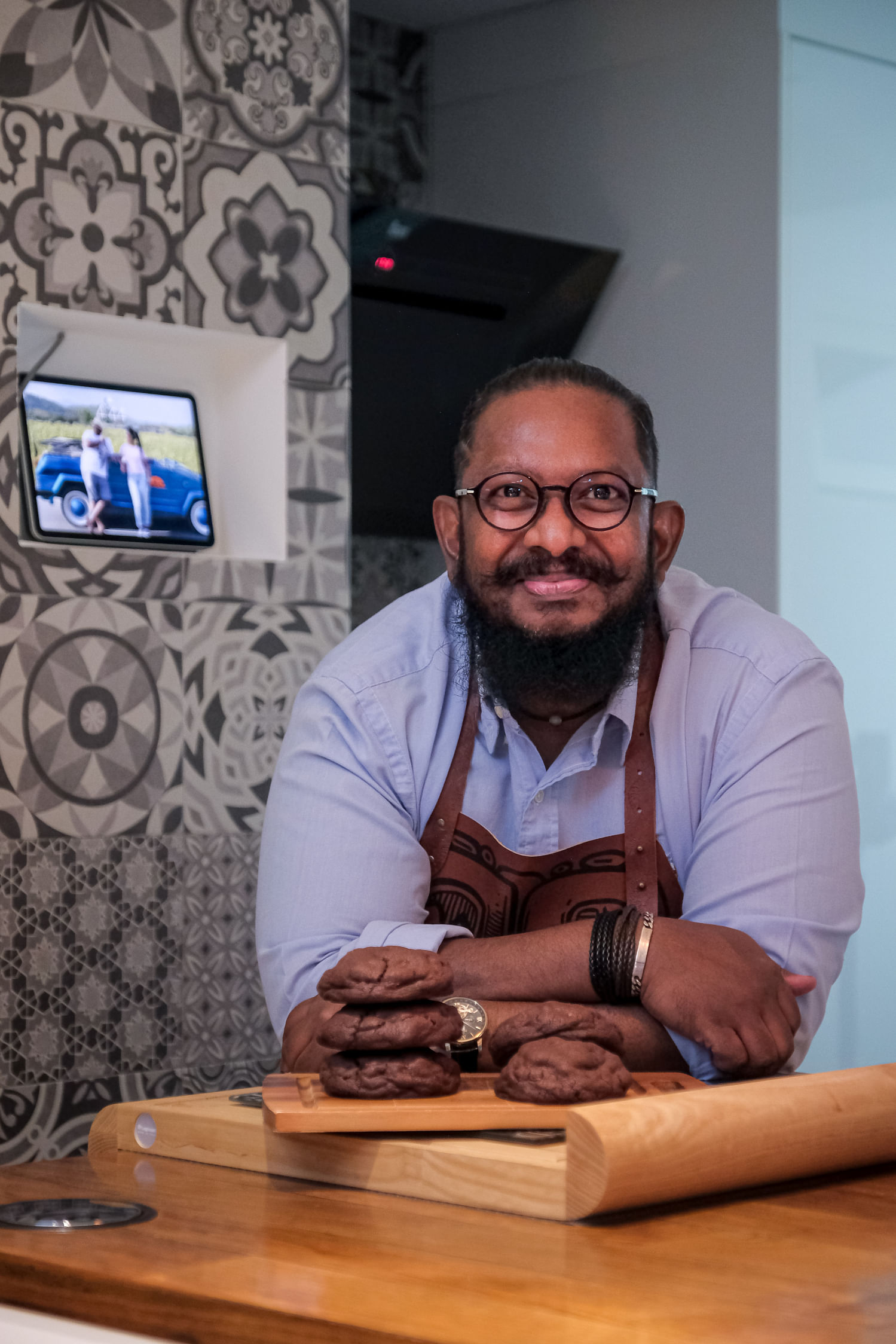Dangers of blood clots: Those who are obese, have severe infection are at risk
Sign up now: Get ST's newsletters delivered to your inbox

Mr Mathavan Veloo underwent a procedure to remove a blood clot blocking an artery in his lungs, during which he had a cardiac arrest.
ST PHOTO: GAVIN FOO
SINGAPORE - In June last year, Mr Mathavan Veloo was buying dinner from Changi Village when he suddenly became breathless and fainted.
A scan at the hospital showed there was a blood clot blocking an artery in his lungs, a condition known as pulmonary embolism (PE).
He underwent a procedure to remove the clot, during which he had a cardiac arrest. Fortunately, he survived the ordeal and was discharged within a week.
"It was unexpected and I was shocked that this happened to me because I exercised regularly and generally maintained a healthy diet," says the 50-year-old, who was a chief technology officer in the aviation industry.
The blood clot was believed to have come from the deep veins of his legs, a condition known as deep vein thrombosis (DVT), which then travelled to the lungs.
Clinical assistant professor Farooq Akram, a senior consultant at Changi General Hospital's Department of Medicine, says more than 50 per cent of patients with DVT have PE at the same time. There were 250 cases of DVT, PE or both recorded last year and in 2019 in total at Changi General Hospital.
Covid-19 patients also have a higher risk of developing blood clots, according to a local study.
Blood clots can also originate from other areas apart from the legs, such as pelvic veins, renal veins and upper extremity veins.
Such abnormal blood clotting can occur when the blood flow is very slow due to immobilised limbs after surgery, excessive bed rest or during long flights of more than eight hours.
But even when the blood flow is normal, blood clots can also form because of obesity, severe infection, cancer or smoking, or if a person is on birth control pills.
In Mr Mathavan's case, he weighed 20kg more than his ideal weight of around 80kg, putting him at risk of abnormal blood clotting.
Respiratory physician Adrian Chan, who is also an intensive care unit and allergy specialist at Respiratory Medical Associates in Mount Elizabeth Novena, says obesity may cause slower blood flow in the veins and may also lead to changes in the clotting system and promote inflammatory changes, making clots easier to form.
Covid-19 patients are also at greater risk.
A study on this - done by a team comprising researchers from Nanyang Technological University, the Agency for Science, Technology and Research's Singapore Immunology Network and the National Centre for Infectious Diseases - was published in the scientific journal eLife in March this year.
Blood samples from 30 patients who had recovered from mild, moderate and severe Covid-19 were collected one month after they had been discharged from the hospital. All of them were found to have blood vessel damage, which could trigger the formation of blood clots.
Dr Chan says: "The hypothesis is that Covid-19 provokes a strong and persistent inflammatory response which may damage the blood vessel walls. This increases the risk of blood clot formation."
Dr See Kay Choong, head and senior consultant at National University Hospital's Division of Respiratory & Critical Care Medicine, says patients with severe Covid-19 may feel breathless, which may result in them moving less and staying in bed, thereby increasing the risk of blood clot formation.
Apart from injections to decrease blood clotting, patients can further reduce the risk of DVT and PE by getting out of bed and walking as soon as possible, drinking enough water to avoid dehydration and not smoking, adds Dr See.

Those who are working from home and are not as active as they used to be need not worry, say experts.
Says Dr Chan: "Working from home does not lead to complete immobility that is seen after a major surgery for instance, so this form of lifestyle is less likely to increase PE cases significantly."
Nevertheless, doctors say everyone should be aware of the symptoms of PE and DVT.
Symptoms of PE include breathlessness, chest pain, cough, dizziness and abnormal heart rhythm. In DVT, one may experience pain, swelling and warmth in one leg, usually in the calf or thigh region. A person may have symptoms of both PE and DVT at the same time.
Mr Mathavan, who is married with no children, had dismissed the swelling in his left calf and ankle as he thought it was a minor irritation caused by a meniscus surgery he underwent about 20 years ago.

ST PHOTO: GAVIN FOO
"Now, I urge everyone to educate themselves about the signs and symptoms of blood clots and not to take them lightly," he says.
Prof Akram says most PE patients who come in to see the doctor are usually stable and treated with anticoagulants. The medication is available as an oral tablet or injection, and helps keep the clots from growing bigger and reduces the likelihood of new clot formation.
However, he adds that some PE patients who come to the hospital with low blood pressure or shock may undergo clot-buster therapy also known as thrombolytics, or clot removal via specialised devices.
In serious cases of PE, a complication known as pulmonary hypertension can also develop.
Dr Chan explains that this occurs when the pressure in the pulmonary arteries becomes too high and the right side of the heart has to pump harder to overcome the pressure, ultimately leading to right heart failure.
Doctors say people can prevent or minimise their chances of getting PE by making lifestyle changes such as exercising regularly and drinking enough water.
Those who sit still for too long on road trips or flights should also consider standing up and walking around every one to two hours, says Prof Akram.
He also advises them to frequently stretch the calf muscles by moving the ankles upwards and downwards, and to stretch the thigh muscles by bending and extending the knees.
Travellers on long flights who are at risk of DVT or PE can also consider the use of below-knee graduated compression stockings that provide 15 to 30 millimetres of pressure at the ankle.
After the health scare, Mr Mathavan decided to "take life slow" and go on a career break to recover.
He is now an independent consultant in the aviation industry and has a home-baking business, selling cookies, cakes and pastries under the handle HubbyWhoBakes on Instagram.
He says: "I never thought I would one day trade my pen for a whisk, from working in the aviation industry to now a home baker. Sometimes, you just know it's time to start something new and trust the magic of new beginnings. I believe there is a purpose for me to be alive today and for the second chance I am given."


